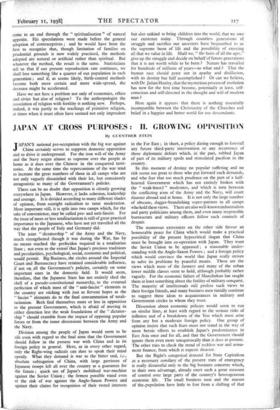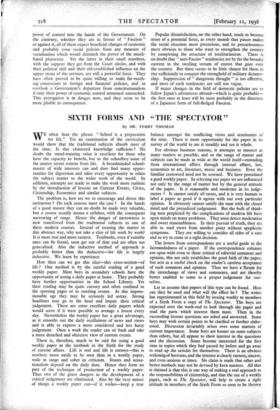JAPAN AT CROSS PURPOSES : II. GROWING OPPOSITION
By GUENTHER STEIN
TAPAN'S national pre-occupation with the big war against LP China certainly serves to suppress domestic opposition and to drive it underground. For the iron will of the Army and the Navy reigns almost as supreme over the people at home as it does over the Chinese in the conquered terri- tories. At the same time the repercussions of the war tend to increase the great numbers of those in all camps who are not only vaguely dissatisfied with their lot, but consciously antagonistic to many of the Government's policies.
There can be no doubt that opposition is silently growing everywhere in Japan. However, it lacks cohesion, leadership and courage. It is divided according to many different shades of opinion, from outright radicalism to tame moderation. More important still, it is split into two camps which, for the sake of convenience, may be called pro- and anti-fascist. For the issue of more or less totalitarianism is still of great practical importance to the Japanese, who have not yet travelled all the way that the people of Italy and Germany did.
The joint " dictatorship " of the Army and the Navy, much strengthened though it was during the War, has by no means reached the perfection required in a totalitarian State ; not even to the extent that Japan's precious traditions and peculiarities, psychological, social, economic and political, would permit. Big Business, the circles around the Imperial Court and Bureaucracy have retained considerable influence, if not ori. all the Government's policies, certainly on some important ones in the domestic field. It would seem, therefore, that the Japanese State has not entirely shed the shell of a pseudo-constitutional monarchy, to the eventual perfection of which most of the " anti-fascist " elements in the country are sticking with just as fervent hopes as the " fascist " elements do to the final consummation of totali- tarianism. Both find themselves more or less in opposition to the present Government, which is afraid of moving in either direction lest the weak foundations of the " dictator- ship " should crumble from the impact of opposing popular forces or from the inner dissensions between the Army and the Navy.
Division among the people of Japan would seem to be rife even with regard to the final aims that the Government should follow in the present war with China and in its foreign policy in general. Here, as in every other regard, only the Right-wing radicals can dare to speak their mind openly. What they demand is war to the bitter end, i.e., absolute subjugation of China, with large garrisons of Japanese troops left all over the country as a guarantee for the future ; quick use of Japan's mobilised war-machine against the Soviet Union ; the firmest possible stand even nt the risk of war against the, Anglo-Saxon Powers and against their claims for recognition of their vested interests in the Far East ; in short, a policy daring enough to forestall any future third-party intervention or any recurrence of those diplomatic defeats which, in the past, robbed Japan of part of its military spoils and stimulated pacifism in the country.
In this moment of destiny no popular suffering and no risk seems too great to those who put forward such demands, and who fear that too much prudence on the part of a half- hearted Government which has not entirely broken with the " weak-kneed " moderates, and which is torn between the conflicting aims of the Army and the Navy, will court disaster abroad and at home. It is not only the large number of obscure, dagger-brandishing super-patriots in all camps who hold these views. There are also well-known industrialists and party politicians among them, and even many responsible bureaucrats and military officers follow such counsels of despair.
The numerous extremists on the other side favour an honourable peace for China which would make a practical possibility of the present hypocritical slogan that China must be brought into co-operation with Japan. They want the Soviet Union to be appeased ; a reasonable under- standing with the Anglo-Saxon Powers ; and a foreign policy which would convince the world that Japan really strives to solve its problems by peaceful means. These are the views which most of the farmers and many of the urban lower middle classes seem to hold, although probably rather vaguely. For the economic failure of Manchukuo has taught them at least something about the futility of military conquest. The majority of intellectuals still profess such views to their foreign friends, and many business men timidly continue to suggest these ideas to acquaintances in military and Government circles in whom they trust.
Dissension about economic policies would seem to run on similar lines, at least with regard to the serious risks of inflation and of a breakdown of the Yen which must arise from any but a moderate foreign policy. One group of opinion insists that such fears must not stand in the way of more heroic efforts to establish Japan's predominance in East Asia once and for all, and that the Government should ignore them even more unequivocally than it does at present. The other tries to check the trend of reckless war and arma- ment finance, from which it expects disaster.
But the Right's categorical demand for State Capitalism as a necessary corollary of the present state of emergency is really distasteful only to the big business concerns which, to their own advantage, already exert such a great measure of control over large parts of the country's heterogeneous economic life. The small business men and the masses of the. population have little to fear from a shifting of that power of control into the hands of the Government. On the contrary, whether they are in favour of " Fascism " or against it, all of them expect beneficial changes of economic and probably even social policies from any measure of socialisation which would diminish the power of the much- hated plutocrats. Yet the latter in their small numbers, with the support they get from the Court circles, and with their political skill and their old-established influence on the upper strata of the services, are still a powerful force. They have often proved to be quite willing to make far-reach- ing concessions in foreign and financial policies, and to overlook a Government's departure from constitutionalism if only their power of economic control remained untouched. This prerogative is in danger now, and they seem to be more pliable in consequence. Popular dissatisfaction, on the other hand, tends to become more of a potential force, as every month that passes makes the social situation more precarious, and its precariousness more obvious to those who want to strengthen the country by completing the structure of totalitarianism. There is no doubt that " anti-Fascist " tendencies are by far the broader current in the swelling stream of unrest that goes over the country. But there seems to be little chance for them to rise sufficiently to conquer the stronghold of military dictator- ship. Suppression of " dangerous thought " is too effective, and most of such tendencies are still too vague.
If major changes in the field of domestic policies are to follow Japan's adventures abroad—which is quite probable— the first ones at least will be most probably in the direction of a Japanese form of full-fledged Fascism.



















































 Previous page
Previous page